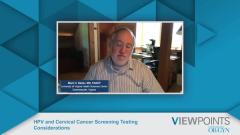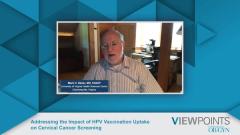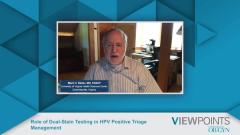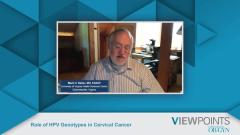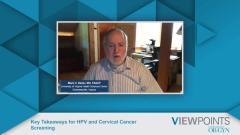
Key Takeaways for HPV and Cervical Cancer Screening
Drs Emily K. Hill, Sangini S. Sheth, and Mark H. Stoler share practice pearls for HPV and cervical cancer screening and express their hope for emerging testing options.
Episodes in this series

Dr Thomas C. Wright Jr: Excellent. As we begin to wrap up this conversation, does anybody have any additional comments they'd like to make? Dr Sheth? Dr Hill?
Dr Emily K. Hill: I ust wanted to comment that we didn't really get a chance to talk about this, but there are, I think, also some studies looking at artificial intelligence and deep learning algorithms to implement some of these technologies that we have for screening; triaging women with HPV related issues is also a kind of an exciting development. Again, we don't have a lot of time to go into it, but a lot of interesting studies are supporting that as a new technology that we can use for helping managing HPV related diseases.
Dr Thomas C. Wright Jr: Essentially using visual methods with artificial intelligence trained algorithms?
Dr Emily K. Hill: Exactly.
Dr Thomas C. Wright Jr: Right. Dr Sheth, any closing thoughts?
Dr Sangini S. Sheth: Yes, my final thought is we focused a lot today on screening, of course we talked about vaccination, and the final piece is that women who have or people who have abnormal results, a key component of that is the linkage to care to follow up on abnormal results, and I think ultimately the goal of this conversation is to close the gap on cervical cancer or even working towards elimination. The last piece of that is that linkage of care of abnormal results, whatever form of screening, we may be using.
Dr Thomas C. Wright Jr: Right, very important points, clearly. Dr Stoler?
Dr Mark H. Stoler: I'd emphasize that last point that the whole purpose of screening is to find the precancer, and if you can't treat the precancer, you're not doing anything with screening. That being said, life is getting a little more complex. We talked about extended genotyping, dual stain, different algorithms. How is the clinician and/or patient supposed to keep this all straight? I think more important than artificial intelligence apply to Pap smears [Papanicolaou tests] as a way of improving the performance of pap smears is the development of information systems and apps like the ASCCP [American Society of Colposcopy and Cervical Pathology] has developed that will essentially allow the app or the program to acquire the data from the patient record. What's the Pap history? What's the HPV test? What's the type? Was dual stain done to then give the clinician more direct guidance? You don't have to remember what the HPV type is. You just need to know whether the patient is safe to get retested in 5 years vs they have to get a colposcopy vs their risk is so high that no matter what the colposcopy shows you might end up treating them anyhow. It's that synthesis of clinical data that we now have so much good data that really says we can more precisely at the individual level synthesize these data and give you a risk that clearly tells the clinician what should happen to the patient. I think we're going to see more and more of that as we go forward because clinicians don't want to really know which test and they don't have time to become necessarily as expert in all the nuances of laboratory testing and data analysis that the data really support.
Dr Thomas C. Wright Jr: Excellent. I'd like to thank all of our panel members for a really informative discussion, and I'd like to thank the viewers for watching this Contemporary OBGYN viewpoint. If you enjoyed the content please subscribe for the newsletters, E-newsletters, to receive upcoming viewpoints and other great content right into your inbox. Thank you all so much, have a good day.
TRANSCRIPT EDITED FOR CLARITY
Newsletter
Get the latest clinical updates, case studies, and expert commentary in obstetric and gynecologic care. Sign up now to stay informed.


